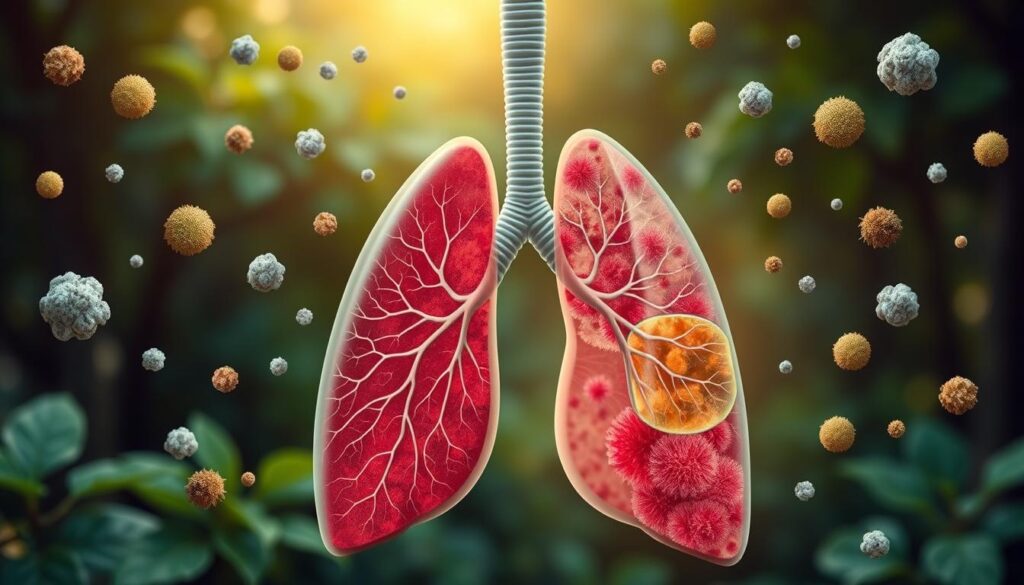Mold allergies can be tough on your health. Tiny mold spores float in the air, causing allergic reactions in some people1. Knowing about mold allergies helps you manage air quality and protect your health2.
The U.S. has about 1,000 mold species, making it a common problem3. Mold grows indoors and outdoors, posing risks for those with allergies1. Your immune system might overreact to these tiny organisms.
Everyone breathes in mold spores daily2. Some people have mild reactions, while others face worse symptoms. These can include stuffy noses, sneezing, and eye irritation3.
Key Takeaways
- Mold allergies affect numerous individuals across the United States
- Mold spores are present in both indoor and outdoor environments
- Symptoms can range from mild irritation to severe respiratory issues
- Managing indoor air quality is crucial for allergy prevention
- Professional diagnosis can help identify specific mold sensitivities
Understanding Mold Allergy and Its Impact on Health
Mold allergies are complex immune responses that affect respiratory health. They occur when your body becomes hypersensitive to fungal allergens in various environments4. Knowing the causes and risks can help you manage mold sensitivity better.
What Causes Mold Allergies
Mold allergies happen when your immune system overreacts to tiny mold spores. These particles trigger antibody production, causing allergic symptoms5. Your body sees fungal allergens as threats, leading to inflammation and breathing issues.
Common Types of Allergenic Molds
Several mold species can trigger allergic reactions. The most common allergenic molds include:
- Alternaria
- Aspergillus
- Cladosporium
- Penicillium
These molds grow indoors and outdoors, peaking in summer and fall5. Indoor spaces can harbor these mycotoxins year-round. This makes ongoing management vital.
Risk Factors for Developing Mold Sensitivity
Your chances of getting mold allergies can increase due to several factors:
- Family history of allergies
- Occupational exposure in high-moisture environments
- Living in humid climates
- Residing in buildings with poor ventilation
Individuals with compromised immune systems are particularly vulnerable to severe mold-related health complications4.
Knowing these risk factors helps you take action. You can better manage your mold sensitivity and protect your respiratory health.
Recognizing Mold Allergy Symptoms and Health Effects
Mold allergies can cause various respiratory symptoms that affect daily life. About 3-10% of people react allergically to mold6. These allergies often lead to uncomfortable and potentially serious health issues.
Knowing the signs of allergic rhinitis from mold exposure is vital. Common symptoms include nasal congestion, itchy eyes, and throat irritation.
Persistent coughing, skin irritation, and breathing difficulties are also possible. These symptoms can significantly impact your well-being.
- Nasal congestion
- Itchy eyes and throat
- Persistent coughing
- Skin irritation
- Difficulty breathing
Mold spores thrive in damp environments. They grow on many surfaces, especially in moist areas like bathrooms and basements7.
People with weak immune systems or existing respiratory issues are at higher risk. They may experience more severe reactions to mold exposure.
| Mold Allergy Impact | Potential Health Effects |
|---|---|
| Mild Exposure | Sneezing, runny nose |
| Moderate Exposure | Wheezing, chest tightness |
| Severe Exposure | Asthma attacks, lung inflammation |
Dealing with mold allergies requires a comprehensive approach. Use air purifiers to lower indoor spore levels. Consult an allergist for tailored treatments like antihistamines or immunotherapy6.
“Prevention and early intervention are key to managing mold-related health risks.”
Conclusion
Mold allergy prevention requires a proactive approach. Understanding mold spore development helps create a healthier indoor environment8. Keeping humidity below 60% is crucial for preventing mold growth.
Reliable dehumidifiers can improve your air quality strategy8. Treatment options include over-the-counter antihistamines and immunotherapy shots8. For persistent symptoms, consult an allergist for a personalized plan.
Indoor air purifiers effectively reduce mold spores and bacteria8. Regular home maintenance is key to mold allergy prevention. Ensure proper ventilation in moisture-prone areas and address water damage quickly.
Clean surfaces regularly to minimize exposure to mold9. Managing mold allergies is an ongoing process. Stay alert and monitor your symptoms closely.
Seek medical advice if allergic reactions become severe9. With the right approach, you can breathe easier. Maintain a healthier living environment for better well-being.
FAQ
What exactly is a mold allergy?
What are the most common symptoms of a mold allergy?
Where are mold spores typically found?
What are the most common types of allergenic molds?
Who is at higher risk of developing a mold allergy?
How can I manage and prevent mold allergies?
Can mold allergies trigger asthma?
Are mold allergies seasonal or year-round?
Source Links
- Mold Allergy Symptoms, Diagnosis, Treatment & Management – https://www.aaaai.org/conditions-treatments/allergies/mold-allergy
- Am I Allergic to Mold Spores? – https://www.webmd.com/allergies/mold-allergy-basics
- Mold Allergy | Causes, Symptoms & Treatment | ACAAI Public Website – https://acaai.org/allergies/allergic-conditions/mold-allergies/
- Mold allergy-Mold allergy – Symptoms & causes – Mayo Clinic – https://www.mayoclinic.org/diseases-conditions/mold-allergy/symptoms-causes/syc-20351519
- Mold Allergy – https://aafa.org/allergies/types-of-allergies/mold-allergy/
- Mold Allergy – Allergy & Asthma Network – https://allergyasthmanetwork.org/allergies/mold-allergy/
- What You Need to Know – https://www.health.ny.gov/publications/7287/
- Allergy to mold: Symptoms, causes, treatment, and FAQs – https://www.medicalnewstoday.com/articles/allergy-to-mold
- Outdoor Mold Allergies: Symptoms, Diagnosis, and Remedies (2024) – https://www.wyndly.com/blogs/learn/outdoor-mold-allergy-symptoms?srsltid=AfmBOop5C7jpYLqKPMNuQfcAhAtFTl0Ez047HMjGXw3tv9f8wWZ12iJx
